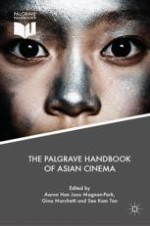2018 | OriginalPaper | Chapter
From Film Stories to National Soft Power: Policies and Film Content of South Korea, Japan, and China
Author : Bruno Lovric
Published in: The Palgrave Handbook of Asian Cinema
Publisher: Palgrave Macmillan UK
Activate our intelligent search to find suitable subject content or patents.
Select sections of text to find matching patents with Artificial Intelligence. powered by
Select sections of text to find additional relevant content using AI-assisted search. powered by
